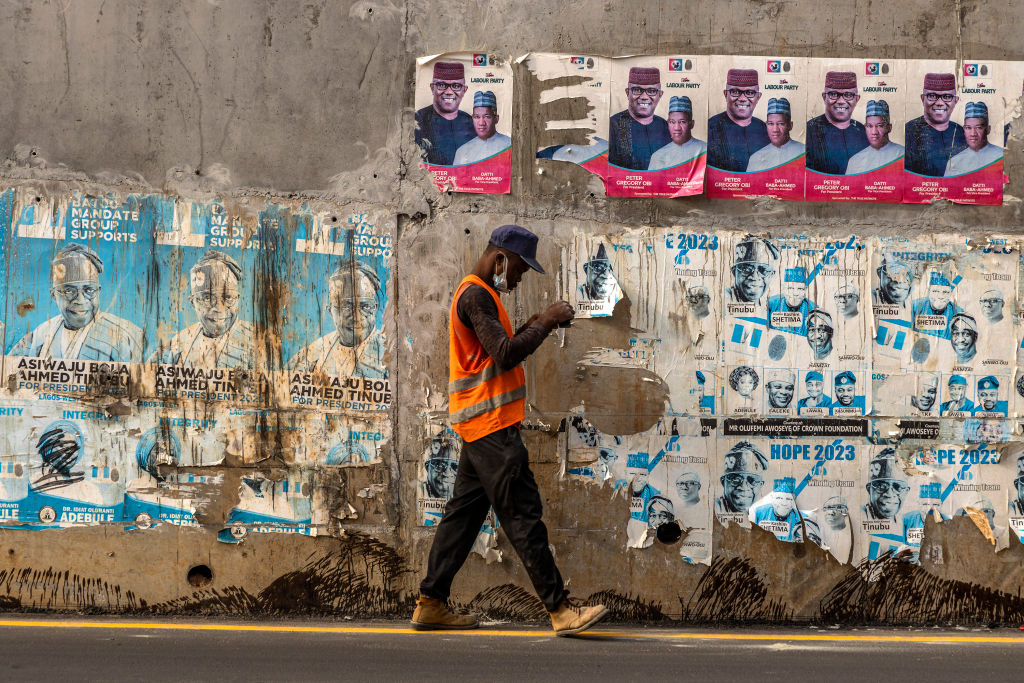
Anyone interested in the future of democracy should pay attention to Nigeria this week. On Feb. 25, the country heads to the polls to elect a new President and parliament in what may be its most competitive, free, and fair election yet.
The seventh national vote since Nigeria’s transition from military rule in 1999, this election will be the first in which none of the leading candidates—Bola Tinubu, Atiku Abubakar, and Peter Obi—are former military commanders. Obi’s lead in the polls, as the candidate of the small Labor Party, has disrupted what was expected to be another two-party contest marred by vote buying. A surge in registration among younger voters and new technologies to ensure the credibility of the vote are also fueling a sense of cautious optimism.
That’s good news—not just for Nigeria, but for democracy around the world.
Nigeria is already Africa’s most populous country and its population is expected to overtake the U.S. by 2050, to become the world’s second-largest democracy. A credible election would position Nigeria as a global democratic leader and bolster Africa’s position as a source for democratic momentum.
With 76% of new voters under the age of 34, youth are key to this transition. They are already playing a central role in a democratic awakening; in 2020, it was the youth-led #EndSARS movement, a reference to Nigeria’s Special Anti-Robbery Squad (SARS), that energized millions of people fed up with police brutality, corruption, and broader government dysfunction to become new voters.
These voters expect democracy to deliver better than it has, given rising poverty and pervasive violence, which the government has used to justify the erosion of human rights. More than 10,000 Nigerians were killed by bandits, jihadists, separatists, police, or the army in the past year alone.
Still, voters are more optimistic than in 2019 when Muhammadu Buhari, a general who ruled the country from 1983 to 1985 following a military coup, won a second term as a civilian President in a ballot plagued by delays, violence, voting irregularities, and intimidation of the political opposition. Since then, the work of civil society groups has prompted Nigeria’s parliament and government to adopt electoral reforms and empower the Independent National Electoral Commission.
For its part, the U.S. has sought to bolster democratic development in Africa, seeing it as critical to American interests as China seeks to make inroads in the continent. Congress has appropriated funds, through grant-making institutions like the National Endowment for Democracy, to bolster the role of civil society and independent media in many African nations.
During a recent trip to Nigeria, I witnessed how this support is enabling civic actors like Yiaga Africa to coordinate a massive national effort to monitor elections. The Kimpact Development Initiative is doing groundbreaking work using data to help mitigate election-related violence. The Socio-Economic Rights and Accountability Project is helping defend journalists and press freedoms. Meanwhile, Anvarie Tech is tapping Big Brother television stars and popular musicians to ensure greater awareness of the electoral process and civic rights, while Joy Inc.’s documentaries spark public debate on police reforms.
That’s just a tiny sampling of the ways Nigerians are acting to achieve the free and fair free election they deserve.
Although democracy has faced recent headwinds around the world, Africa could help usher in a global democratic renewal. The continent has seen a string of elections—in Malawi, Zambia, The Gambia, Mauritius, Lesotho, and Kenya—that have bolstered democracy. Even Angola’s undemocratic process has seen an opposition movement win 44% of the vote.
A successful election on Saturday in Nigeria could encourage Senegal to stay the course and set the scene for upcoming votes in Sierra Leone, Liberia, and the Democratic Republic of Congo, a country as large as Western Europe. Free and fair voting would also empower Nigeria to press its northern Sahel neighbors to end military rule and help hold Zimbabwe to account as it votes this year.
Showing that democracy delivers will be the test for Nigeria’s new leaders. Less bureaucratic control of Nigeria’s economy, for example, could unleash its creative potential already evident in the jobs and world-class products produced by Nigeria’s tech sector and film and music industry.
With democracy under attack in so many places throughout the world, Nigeria deepening its democratic roots is a major development worth watching and supporting by freedom-loving societies everywhere.
More Must-Reads from TIME
- Cybersecurity Experts Are Sounding the Alarm on DOGE
- Meet the 2025 Women of the Year
- The Harsh Truth About Disability Inclusion
- Why Do More Young Adults Have Cancer?
- Colman Domingo Leads With Radical Love
- How to Get Better at Doing Things Alone
- Michelle Zauner Stares Down the Darkness
Contact us at letters@time.com